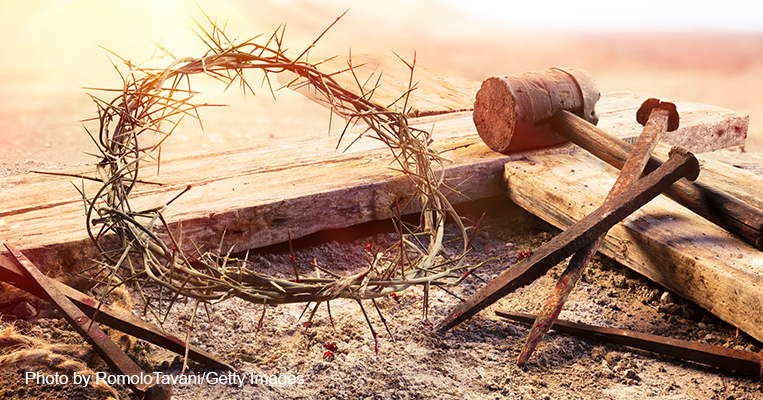By David Closson
For many people, 2022 began with a lot of promise. But recent developments have once again reminded us of the consequences of living in a fallen world. Over the past few weeks, headlines have been dominated by ghastly war crimes committed against the Ukrainian people. We’ve also learned about five fully formed babies who may have been the victims of illegal partial-birth abortions or infanticide in our nation’s capital, and rising prices for gas and other consumer goods are forcing families to make difficult decisions. A divisive U.S. Supreme Court confirmation seems to have only exacerbated partisan political tensions.
In short, the religious, political, and cultural fault lines that divide Americans have resurfaced, and pessimism and anxiety are once again clouding the optimism that many of us felt earlier in the year.
On some level, the disillusionment many are feeling today is not unlike how Jesus’ followers must have felt on the first Good Friday. Less than a week after His triumphant arrival into Jerusalem, Jesus is now gasping for breath on a Roman cross while His friends look on helplessly and His enemies gloat. The hope and triumph of Palm Sunday is a distant memory.
Of course, those familiar with the Bible’s storyline know that Friday is not the end of the story. Easter is on the horizon. But Jesus’ resurrection is only glorious because of His obedience and faithfulness in death. Thus, it is appropriate on Good Friday to dwell for a while on the horror and sorrow of the crucifixion as we await Resurrection Sunday.
Jesus’ Final Hours
According to the New Testament, Jesus’ final week began with His euphoric entry into Jerusalem on Palm Sunday. Over the ensuing days, Jesus ministered to crowds of Jewish pilgrims, outmaneuvered religious leaders seeking to embarrass and ensnare Him, and prepared the disciples for the end of His earthly mission. By Thursday evening, Judas’ treasonous plan was in motion. Following the Passover meal with his disciples, Jesus enters the Garden of Gethsemane to pray. In the shadows of the olive trees, Jesus prays earnestly and prepares to face God’s wrath against humanity’s sin (Luke 22:41-44).
After praying in the garden, Jesus is arrested, the disciples flee, and He is taken before the Sanhedrin. After a hastily arranged mock trial held in the middle of the night, Jesus is brought before Pontius Pilate, the Roman governor of the region. After an initial interrogation, Pilate has Jesus flogged, assuming this punishment would appease Jesus’ opponents. But the crowd, incited by their jealous leaders, demands Jesus’ crucifixion. Reluctantly, Pilate consents, fearful of the frenzied crowd’s growing unrest.
Forced to carry His own cross, Jesus arrives at Golgotha, a public place outside the city. There, He is crucified between two criminals, fulfilling an Old Testament prophecy that predicted God’s Messiah would be “numbered with the transgressors” (Isaiah 53:12). For about six hours, Jesus hangs on the cross, His bloodied body in view of everyone passing by, including jeering soldiers and Jewish religious leaders. At last, around 3 o’clock in the afternoon, the Son of God breathes His last and dies (Luke 23:46). Jesus’ body is given to Joseph of Arimathea, who quickly buries Jesus in a nearby tomb.
God’s Plan for Salvation
Jesus’ final hours and crucifixion prompt questions. Why would God allow Jesus to endure so much pain and torture? In what way is the Bible’s teaching about Jesus’ death “good”? To answer these questions, it is important to recall what the Bible teaches about God’s heart for sinners and His plan to redeem them.
First, it is important to understand that the horrifying events of Good Friday were central to God’s plan of redeeming sinners. Scripture teaches that Jesus was “delivered up according to the definite plan and foreknowledge of God” (Acts 2:23). Moreover, Jesus’ enemies did what God “had predestined to take place” (Acts 4:28). The infamy and pain of the crucifixion were God’s plan from the beginning. Everything that took place — Judas’ betraying, the Sanhedrin’s conniving, Pilate’s adjudicating, and the crucifixion itself — was the ordained means by which God worked to save sinners.
Consequently, the events of Friday must be seen within the context of God’s sovereignty; everything that occurred was ordained by God. Nothing surprised God or caught Him off guard. Every event, every decision, down to the last detail, was orchestrated and planned. Although the actors in the story — including Pilate, the Sanhedrin, and the Roman soldiers — were morally responsible for their actions, their actions unfolded within the sovereign determination of God.
This raises another question: if Jesus’ death was part of God’s plan to redeem sinners, why did He have to suffer so much? In other words, why was Jesus’ death so awful?
This brings us to our second point, the awful reality of human sinfulness. In the Garden of Eden, Adam and Eve were given a choice. Instead of obeying God, the first couple listened to Satan and disobeyed their Creator. Their rebellion brought about massive consequences. In theological terms, Adam and Eve’s disobedience was sin, a blatant violation and transgression of God’s law. As humanity’s representative head, Adam’s sin was passed down to his descendants. As the apostle Paul explains, “Sin came into the world through one man, and death through sin, and so death spread to all men because all sinned” (Rom. 5:12).
Sin separates us from God. And all of us have sinned. As Paul explains, “all have sinned and fall short of the glory of God” (Rom. 3:23). Moreover, because sin is such an affront to God, the consequence of sin is death (Rom. 6:23). This is what God had warned Adam and Eve about in Eden; rebellion against God would result in physical and spiritual death (Gen. 2:16-17).
Third, the reality of sin places humanity in a precarious state. God is perfect and cannot abide sin (Hab. 1:13). Therefore, if there is going to be any hope for humanity, God must take the initiative and reverse sin’s curse. And incredibly, that’s exactly what He did. The Bible teaches that God is loving and desires that none perish (1 Tim. 2:4). This is why Jesus, the second person of the Trinity, became incarnate (embodied in flesh) (Phil. 2:7). This brings us to Good Friday. Jesus lived a sinless life and died in the place of sinners as a sacrifice (Heb. 9:26). As Paul explains in Romans 5:8, “But God shows his love for us in that while we were still sinners, Christ died for us.” The most well-known verse in the Bible, John 3:16, teaches the same truth: “For God so loved the world, that he gave his only Son, that whoever believes in him should not perish but have eternal life.”
These verses relay the core of the gospel. By providing a perfect sacrifice for sin, Jesus removed God’s wrath toward sinners and fully satisfied God’s justice (1 John 4:10). Through His death and resurrection, Jesus overcame humanity’s separation from God and provided a way for us to be reconciled with God (2 Cor. 5:18-19).
In other words, the “good news” of Christianity is the atoning work of Jesus. Now, by repenting of sin and turning in faith to Christ, sinful people can be forgiven of their sins (Rom. 10:9-10). As Paul explains, “For our sake he made him to be sin who knew no sin, so that in him we might become the righteousness of God” (2 Cor. 5:21). In this verse and others, the Bible teaches what theologians refer to as “penal substitution,” the idea that Christ bore the penalty of sin when He died and that in death He substituted himself for sinners. Those who trust in Christ’s atoning work are justified in God’s sight, meaning they are now declared righteous.
Because of Jesus’ saving work on our behalf, it is appropriate to call this dark day “good.” Good Friday is good because Jesus paid the price for our sins. Moreover, it is good because He not only died in our place, but He was also raised to life. On Easter Sunday, we celebrate Jesus’ resurrection, which attests to His power over death. His resurrection is what Scripture describes as the “first fruits of those who have fallen asleep” (1 Cor. 15:20). As Jesus was resurrected, so will His followers when He comes again.
So, even as we reflect on a difficult year, Good Friday gives us perspective. If God can redeem Good Friday, with all of its pain, horror, and suffering, He can redeem anything — including us. For many of us, today might be dark. But take heart; hope is on the horizon.
Today is Friday, but Sunday is coming.
















